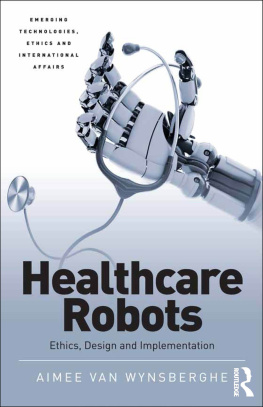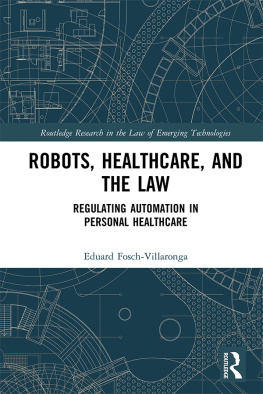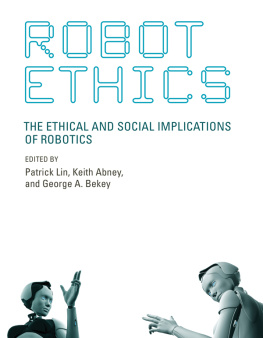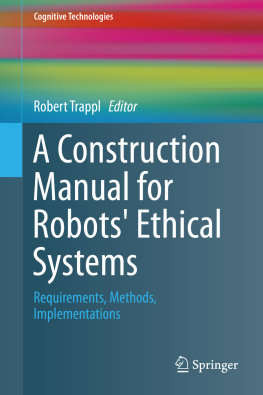HEALTHCARE ROBOTS
Emerging Technologies, Ethics and International Affairs
Series editors:
Jai C. Galliott, The University of New South Wales, Australia
Avery Plaw, University of Massachusetts, USA
Katina Michael, University of Wollongong, Australia
This series examines the crucial ethical, legal and public policy questions arising from or exacerbated by the design, development and eventual adoption of new technologies across all related fields, from education and engineering to medicine and military affairs.
The books revolve around two key themes:
Moral issues in research, engineering and design.
Ethical, legal and political/policy issues in the use and regulation of Technology.
This series encourages submission of cutting-edge research monographs and edited collections with a particular focus on forward-looking ideas concerning innovative or as yet undeveloped technologies. Whilst there is an expectation that authors will be well grounded in philosophy, law or political science, consideration will be given to future-orientated works that cross these disciplinary boundaries. The interdisciplinary nature of the series editorial team offers the best possible examination of works that address the ethical, legal and social implications of emerging technologies.
Forthcoming titles:
Legitimacy and Drones
UCAVs for Cross-Border Counterterrorism
Edited by Steven J. Barela
Commercial Space Exploration
Ethics, Policy and Governance
Edited by Jai Galliott
Healthcare Robots
Ethics, Design and Implementation
AIMEE VAN WYNSBERGHE
University of Twente, the Netherlands
First published 2015 by Ashgate Publishing
Published 2016 by Routledge
2 Park Square, Milton Park, Abingdon, Oxon OX14 4RN
711 Third Avenue, New York, NY 10017, USA
Routledge is an imprint of the Taylor & Francis Group, an informa business
Copyright Aimee van Wynsberghe 2015
Aimee van Wynsberghe has asserted her right under the Copyright, Designs and Patents Act, 1988, to be identified as the author of this work.
All rights reserved. No part of this book may be reprinted or reproduced or utilised in any form or by any electronic, mechanical, or other means, now known or hereafter invented, including photocopying and recording, or in any information storage or retrieval system, without permission in writing from the publishers.
Notice:
Product or corporate names may be trademarks or registered trademarks, and are used only for identification and explanation without intent to infringe.
British Library Cataloguing in Publication Data
A catalogue record for this book is available from the British Library.
The Library of Congress has cataloged the printed edition as follows:
Wynsberghe, Aimee van, author.
Healthcare robots : ethics, design and implementation / by Aimee van Wynsberghe.
p. ; cm. -- (Emerging technologies, ethics and international affairs)
Includes bibliographical references and index.
ISBN 978-1-4724-4433-2 (hardback) -- ISBN 978-1-3155-8639-7 (ebook) -- ISBN 978-1-3171-2315-6 (epub)
I. Title. II. Series: Emerging technologies, ethics and international affairs.
[DNLM: 1. Patient Care--ethics. 2. Robotics--ethics. 3. Equipment Design. 4. Robotics--instrumentation. 5. Social Values. QT 36.2]
R857.R63
610.284--dc23
2014046618
ISBN: 9781472444332 (hbk)
ISBN: 9781315586397 (ebk-PDF)
ISBN: 9781317123156 (ebk-ePUB)
Contents
For Aria and Scott
List of Tables
Preface
There are many who believe in the wonderful potential of robotics technology and there are many who are terrified of enveloping robots into society. Both groups insist that we should proceed with caution when it comes to the development and implementation of robots to avoid negative consequences. To my great astonishment, there are also individuals who believe there are no ethical concerns to consider in the design of care robots because none have revealed themselves so far.
In response to this intuition I suggest one look at any new technology in healthcare and to reflect on the unanticipated ethical considerations: new technologies shape cultural norms and assumptions about not only what is healthy but what is the appropriate standard of care. Once robots enter the picture, healthy individuals may be defined by their lack of reliance on a personal robot in the home. Vice versa, you could be considered unhealthy if you need a robot to assist with some part of your activities of daily living. From this we might consider if there will be repercussions for insurance companies? Care robots integrated into hospital contexts may become standard practice once proven to provide effective care. It may be possible one day that healthcare institutes are obliged to provide care with the use of robots. This is not far-fetched when you consider the use of new surgical tools, such as endoscopic tools, that faced stern criticism when first introduced but which are now standard practice in most surgical suites.
But these are not even the most interesting ethical considerations! As a robot ethicist, what I find to be the most pressing questions are those that deal with how robots are thought to work in care contexts and how this relies on a variety of assumptions about what care looks like in context. From these assumptions, both implicit and explicit, the robot is designed. Through this design, assumptions about values and norms are reinforced; practices are reinforced or are changed. It is this cycle that requires careful reflection in order for us as a society to decide when and where we want to have these robots.
In order to do justice to a book that dealt with understanding care in the context of a hospital and/or nursing home I spent time observing and volunteering in those contexts. It was during those moments that I learned of the wonderful benefits that robots could provide in a healthcare system but it was also during that time that I understood the very real threats to care that robots posed. This was one of the factors that shaped my opinion on the design and use of care robots, namely to take a middle ground and insist on the ethical shaping of the technology rather than on stopping the technology altogether.
This book is meant to pause and take a moment to consider all the good and bad attributed to robots in healthcare, and to bring these considerations into the design process. This is not the central aim of the book; rather, it is the starting point. With this book I want to take a proactive stance to robot development and to show that it is possible to shape the coming care robots in a way that takes the values in care as a central focus: care robots designed based on care values. These values are not abstract unattainable values but are in fact definable and attainable once we have a very specific description of a care practice. So my task here is to bring together the perspectives of multiple disciplines in order to join them in a framework for care robot design. The goal of my future career will be to put this framework into practice in the hopes of integrating ethics directly into the industrial context where care robots are designed and developed. So, heres to the future!














